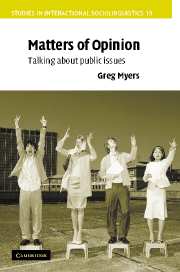Book contents
- Frontmatter
- Contents
- Acknowledgments
- Transcription conventions
- Focus-group data
- 1 Paradoxes of opinion
- 2 A tool kit for analysing group discussions
- 3 Forums for opinion: ‘What is it that's going on here?’
- 4 Institutions of opinion: voice of the people?
- 5 Topics in interaction: ‘Why that now?’
- 6 Agreeing and disagreeing: maintaining sociable argument
- 7 Representing speech: other voices, other places
- 8 Questioning expertise: Who says?
- 9 Radio phone-ins: mediated sociable argument
- 10 Vox pop television interviews: constructing the public
- 11 Opinions as talk
- References
- Index
1 - Paradoxes of opinion
Published online by Cambridge University Press: 22 September 2009
- Frontmatter
- Contents
- Acknowledgments
- Transcription conventions
- Focus-group data
- 1 Paradoxes of opinion
- 2 A tool kit for analysing group discussions
- 3 Forums for opinion: ‘What is it that's going on here?’
- 4 Institutions of opinion: voice of the people?
- 5 Topics in interaction: ‘Why that now?’
- 6 Agreeing and disagreeing: maintaining sociable argument
- 7 Representing speech: other voices, other places
- 8 Questioning expertise: Who says?
- 9 Radio phone-ins: mediated sociable argument
- 10 Vox pop television interviews: constructing the public
- 11 Opinions as talk
- References
- Index
Summary
‘No opinion’.
That's the last box the survey offers, after all the choices the researcher can imagine, and the humiliating ‘Don't know’. The British news magazine The Economist used to have an advertisement saying simply:
No Economist. No opinion.
Apparently readers are terrified at the thought of being unable to give an opinion on some topic when challenged, even if that opinion has to be provided by a magazine. Somehow it is important in a society that considers itself democratic that everyone have an opinion on certain issues, and that they be willing and able to tell other people what it is. Yet everyone must control their expressions of opinion as well; it is never a compliment to call someone ‘opinionated’.
If we ask why we should have these opinions, why we need them ready for conversation, or why we should read a magazine to find them, we come to a series of paradoxes in our opinions about opinions:
We cherish our own opinions, but we can also dismiss opinions as a poor substitute for facts.
Opinions are meant for public discussion, but are also private, individual, protected.
Opinions are personal, but shared with a group.
Opinions display one point of view, but the same speaker can express two contradictory opinions.
Expressions of opinions are assumed to be ephemeral, but are also part of the on-going structure of society.
Each individual expression of an opinion is limited to a particular space and time, but ‘public opinion’ has broad effects on national or global events.
- Type
- Chapter
- Information
- Matters of OpinionTalking About Public Issues, pp. 1 - 21Publisher: Cambridge University PressPrint publication year: 2004



